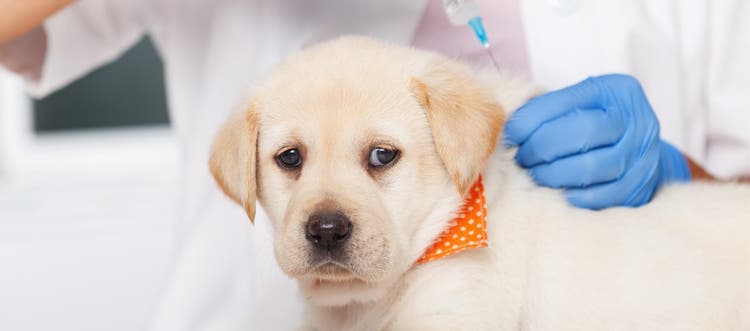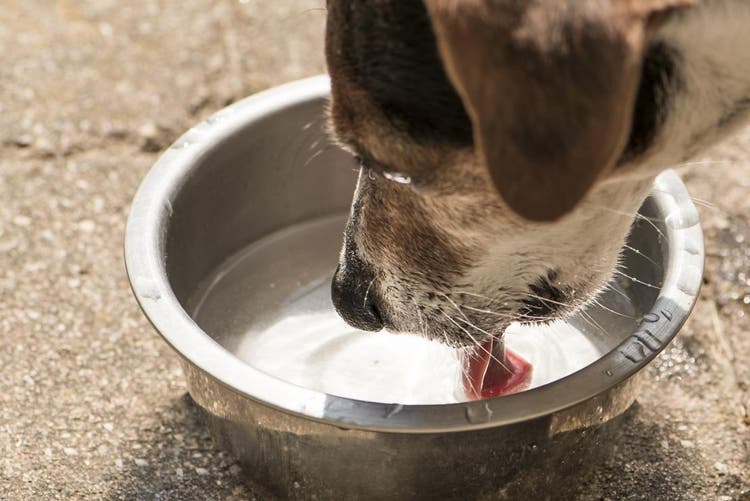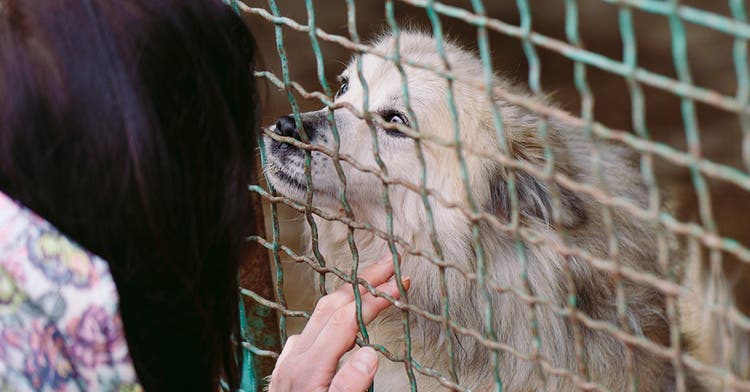Know when to call the vet by recognizing these signs.
You come home and your dog isn't waiting by the door for you. They aren't wagging their tail looking to play fetch, and their posture has stiffened. The food in their bowl is left untouched. You can tell something is wrong — and you're probably right.
While dogs can’t tell you they’re sick, they can show you by exhibiting signs they aren’t well. These range from behavior changes, lethargy and weight fluctuations to more obvious red flags like vomiting and diarrhea.
Remember that you know your dog best. If anything feels off, call your vet to see if a visit is needed.
Here’s how to recognize the common signs of a sick dog.
How Can I Tell If My Dog Is Sick?
1. Change in Behavior
Changes in your dog's behavior can be subtle, but keep a close eye on your pup if they alter their routine. If your dog always waits for you by the door and fails to show up for two days in a row, something is likely bothering them. If your gentle, happy dog is suddenly snapping and growling, that's a clear sign something is wrong. Or is your pup panting more than usual? It may be time to call the vet.
A sudden shift in your dog’s behavior may include:
- Sleep changes
- Constant pacing
- Increased aggression
- Whining
- Disorientation
- Refusing to leave your side
- Other clear behavioral changes that could indicate your dog is suffering
When to call the vet: Behavior changes paired with other problems in appetite, lethargy and physical differences increase the risk that the problem is serious and indicate your dog should be taken to a veterinarian.
What Could My Dog’s Behavior Change Mean?
Sometimes these behavior changes are part of the aging process for dogs, but other times they can indicate problems such as pain (an ear infection, for instance), arthritis or age-induced memory loss. These behaviors also can be symptoms of a brain tumor or even dementia, known as cognitive dysfunction syndrome.1
Dementia in dogs is similar to Alzheimer's disease in humans and typically affects older dogs' memory, behavior and other cognitive functions. If your dog is suddenly having accidents or refusing to play fetch, they may have cognitive dysfunction syndrome. While this problem gradually worsens over time because there's no cure, dogs with dementia can still live happy, active lives. Visiting a veterinarian early is key to developing a plan. Treatment involving routines, exercise and prescription drugs that increase dopamine activity in the brain have been proven to slow the progression of the disease.
2. Lethargy
Some dogs prefer to lounge around, and many people have couch-potato pups. Dogs will sleep for longer periods as they age, too. However, a dog breaking their routine and becoming more lethargic than usual can signal a larger problem.
Watch for these signs of lethargy:
- Slower movement
- Sleeping more than usual
- Disinterest in activities or items they previously enjoyed (like their favorite ball or the treat you’re offering)
When to call the vet: Contact your vet if your dog is severely lethargic, wobbly or sleepy, or if lethargy persists over several days. Seek veterinary care immediately if lethargy is coupled with other concerning signs, such as bloody diarrhea, vomiting or appetite loss — it could be a sign of parvovirus, a serious, potentially deadly condition that affects puppies and unvaccinated dogs.
What Could My Dog’s Lethargy Mean?
If your dog usually sprints to their doggy bowl after you fill it with water but has suddenly or gradually slowed down their pace, this is a sign your dog could be weak and suffering from an illness or injury.
Lethargy can also be a sign of infections, chronic pain or even life-threatening diseases. Several infections, such as parvovirus2, kennel cough3 and heartworm disease4, will make your dog appear very tired. Heart problems, liver problems and diabetes can also leave your dog weak and lethargic.
3. Weight Change
Weight fluctuation is a common sign of illness for dogs, but it can be hard to tell if your dog is getting heavier or lighter. People typically don't weigh their pets, so they may not even realize their dog has lost or gained weight. You can easily weigh small dogs with your home scale, and you can usually stop by your veterinarian's office for free and do a quick weigh-in. Remember that for smaller dogs, even losing one pound could mean a change in more than 10% of their body mass.
When to call the vet: If your dog is steadily or suddenly gaining or losing weight, this could indicate several underlying health issues. Consult your vet for a full diagnosis and next steps.
What Could My Dog’s Weight Change Mean?
Weight loss is a symptom of cancer, intestinal parasites, gastrointestinal (GI) disorders5 and chronic renal failure6, among other conditions. GI disorders affect a dog's stomach and intestines and often affect digestion; they can be caused by allergies, eating a nonedible object or hereditary problems. Chronic renal failure (kidney disease) can be caused by infection or poison (make sure your pup never rummages through the medicine cabinet!), or it can be inherited — in which case the disease can only be managed. Vomiting and diarrhea are also major symptoms of GI disorders.
Weight gain can also be a major symptom of sickness. Your dog may love to eat, but if their belly starts dragging on the floor or looks bloated, this could be a sign of tumors, heart disease, hypothyroidism7 or Cushing's disease8, among other ailments.
Hypothyroidism is common in certain dogs, such as Golden Retrievers and Doberman Pinschers, and can be treated with hormone replacement therapy. Cushing's disease can be caused by tumors and occurs when a dog produces too much cortisol; a common symptom is a pot belly.
4. Vomiting
Occasional vomiting isn't necessarily unusual and could be the result of eating too fast or too much. But persistent vomiting or vomiting that contains blood is cause for concern.
When to call your vet: Check your dog's vomit for random objects, bone fragments and blood. If any of these appear, call your vet. Likewise, if your dog vomits multiple times in one day or over several days, or if vomiting is coupled with bloody diarrhea, fever or sudden weight loss, a trip to the veterinarian is in order.
What Could My Dog’s Vomiting Mean?
Dogs are often naturally curious and can digest things they shouldn’t, such as garbage, a child’s toy, human medication, household chemicals or certain houseplants. Your dog may have simply eaten something that disagreed with them — or their vomiting could be a sign of serious illness, including digestive problems, kidney disease, liver disease or a rupture in the esophagus.
Kidney disease and liver disease9 can be the results of age, breed and/or ingesting poisonous substances. These diseases will likely need to be treated for the rest of your dog's life.
5. Diarrhea
Diarrhea isn't always a sign to panic, and can be brought on by something as simple as introducing a new food into your dog's diet. However, it can also indicate a major problem if it occurs frequently — especially if accompanied by vomiting and other symptoms such as lethargy and loss of appetite.
When to call the vet: “Why is my dog pooping blood?” is a question no pet owner ever wants to ask — but it’s definitely a cause for concern. Stool containing blood or mucus is a sign your dog needs medical care and should see a veterinarian as soon as possible. Watery diarrhea is also a major problem, and excessive diarrhea can lead to dehydration.
What Does My Dog’s Diarrhea Mean?
Parvovirus is one of the more serious diseases linked to bloody diarrhea2. This illness afflicts young puppies or unvaccinated dogs and often leads to other infections. A dog that has diarrhea from parvovirus will likely need a hospital trip and prescription drugs. If treated, dogs have a 68-92% chance of survival from parvovirus; untreated parvovirus cases often lead to death.
If you suspect your dog has parvovirus, seek veterinary care right away.
6. Change in Appetite
A sudden change in how much a dog eats — either overeating or loss of appetite — is an obvious sign that something isn't right. Just as humans don't want to eat when they aren't feeling 100%, neither do dogs.
When to call the vet: If your dog skips more than one meal or seems generally disinterested in their food, this indicates your dog isn’t feeling well — contact your vet. The same goes for if your dog suddenly starts gorging on their food, excessively begging for more food or stealing food from other pets’ bowls, as this could also point to an underlying health condition. Speak to your vet to be sure.
Your dog may be nibbling on the outer edges of the dog bowl or licking their plate clean and asking for seconds. If this behavior isn't normal for them, it's important to consult a veterinarian to determine if illness is the problem.
What Could My Dog’s Change in Appetite Mean?
While dogs may eat less because of common factors such as rising outdoor temperatures or stress, a loss of appetite coupled with other symptoms can be a sign of liver disease, kidney disease, infection, cancer or dental disease.10
If a dog has an infection or inflammation in their gums or mouth, it may be painful to eat. In addition to loss of appetite, owners can check their pups for bleeding in the gums, mouth irritation and excessive drooling. Dog owners should also develop a dental hygiene routine that includes daily teeth brushing to avoid periodontal disease and help keep their dogs happy and healthy. If you notice pale gums, take your pet to the vet right away.
Loss of appetite can be a symptom of several different ailments and should always be taken seriously. Increased appetite could be a sign of illness as well, including diabetes11 or hormonal problems.
Dogs with diabetes are often ravenous because their bodies aren't allowing them to receive all the nutrients they need, despite keeping a steady diet. Diabetes is ultimately very treatable if caught early.
7. Excessive Drinking and Urinating
Increased thirst could be a sign of several diseases or illnesses. If your dog is drinking a lot, they're probably urinating a lot, too. This can be another sign of possible sickness.
When to call the vet: Dogs are naturally thirsty after spending time outside in the heat or after vigorous exercise, but if your dog can’t seem to get enough water, schedule an appointment. If your housetrained dog is having frequent urine accidents or starts asking to go out more often than usual, this could be cause for concern, too.
What Could My Dog’s Excessive Drinking and Urinating Mean?
Excessive thirst in dogs can signal a urinary tract infection12, diabetes and kidney disease. Problems with urinating, including frequent accidents and straining, can be signs of bladder or kidney stones, hormonal disorders or kidney or liver disease.
More than 10% of dogs contract a urinary tract infection at some point in their lives, so keep an eye out for accidents, straining or frequent trips outside. Undetected UTIs can lead to cancer, painful stones and kidney disease.
Should I Call the Vet?
If your dog is exhibiting more than one symptom, or if the symptom has lasted more than a day or two, it's a sign your pet needs to see a veterinarian. And even if your dog doesn't exhibit any of these signs of illness, don't hesitate to take them to the vet if they're acting out of character or if you have any concerns about their health.
No one knows your dog as well as you. Trust yourself and your instincts. Always err on the side of caution and your pup will be back at your door, wagging their tail, ready for games and chowing down on their food in no time.
References
1 Cognitive Dysfunction Syndrome. (n.d.) Retrieved May 31, 2020, from https://indoorpet.osu.edu/dogs/aging_pets/cds
2 Burke, A. (2021, May 26) What Every Puppy Owner Needs to Know about Parvo in Puppies. Retrieved October 25, 2021, from https://www.akc.org/expert-advice/health/what-every-puppy-owner-needs-to-know-about-parvo-in-puppies/
3 Kennel Cough in Dogs — Symptoms, Treatment and Prevention. (2019, January 23) Retrieved May 31, 2020, from https://www.akc.org/expert-advice/health/kennel-cough-symptoms-treatment-and-prevention/
4 Center for Veterinary Medicine. (n.d.) Keep the Worms Out of Your Pet’s Heart! The Facts about Heartworm Disease. Retrieved October 25, 2021, from https://www.fda.gov/animal-veterinary/animal-health-literacy/keep-worms-out-your-pets-heart-facts-about-heartworm-disease
5 Gastrointestinal and Digestive Disorders in Dogs: Types and Causes. (2015, September 11) Retrieved October 25, 2021, from https://www.hillspet.com/dog-care/healthcare/dog-gastrointestinal-and-digestive-problems
6 Managing Kidney Failure in Dogs. (2018, November 6) Retrieved October 25, 2021, from https://www.hillspet.com/dog-care/healthcare/kidney-failure-in-dogs
7 Flowers, A. (2018, November 8) Hypothyroidism in Dogs: Symptoms and Treatment. Retrieved May 31, 2020, from https://www.webmd.com/pets/dogs/hypothyroidism-in-dogs
8 PetMD. (2019, October 08) Cushing's Disease in Dogs. Retrieved May 31, 2020, from https://www.petmd.com/dog/conditions/endocrine/cushings-disease-dogs
9 Facts about Liver Disease in Dogs. (2015, August 22) Retrieved October 25, 2021, from https://www.hillspet.com/dog-care/healthcare/liver-disease-in-dogs
10 Fries, W. C. (2012, September 27) The Perils of Gum Disease in Dogs. Retrieved May 31, 2020, from https://www.webmd.com/pets/dogs/features/perlis-gum-disease-dogs
11 Diabetes in Dogs: Symptoms, Causes and Treatment. (2019, November 05) Retrieved May 31, 2020, from https://www.akc.org/expert-advice/health/diabetes-in-dogs/
12 Burke, A. (2019, November 06) Does Your Dog Have UTI Symptoms or Something Worse? Retrieved October 25, 2021, from https://www.akc.org/expert-advice/health/noticing-dog-uti-symptoms-could-be-something-more/
Always read, understand and follow the label and use directions.











